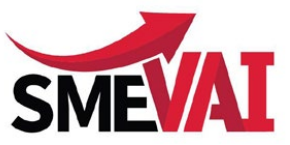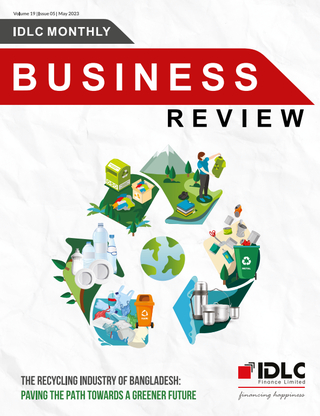
SMEVai Technologies Limited
Interviewed by Syed Md. Rakeen, Team MBR
SMEVai Technologies Limited is a cloud-based platform offering one-stop business solutions to make SMEs bankable in Bangladesh. The company adopts a ‘tech and touch’ approach, where it leverages technology with a hint of human expertise. It provides solutions to the primary business requirements of Small and Medium-sized Enterprises (SMEs), namely accounting, marketing, legal, and training services. With a view to growing its paid users to 5,000 by 2023, it envisions empowering 100,000 SMEs within the next five years. Team MBR was in conversation with Mr. Mahadi Hasan Sagor to learn about his inspirations and vision for devising solutions for SMEs.
Syed Md. Rakeen: SMEVAI is a web platform that provides various solutions to meet the major business necessities of small and medium-sized enterprises (SMEs). Would you kindly share with us how you came up with this idea?
Mahadi Hasan Sagor: We found a long-unaddressed problem and a big market opportunity (if the problem can be addressed). Hence we started SMEVai. There are over 7 million SME & MSME businesses in Bangladesh, which contribute to 70-80% of the non-agricultural sector employment. Despite being the bloodline of our economy, these millions of SMEs struggle to access bank finance while scaling their businesses. Why can’t they access bank financing? Mostly because of the following two reasons: lack of preparedness and lack of compliance. SMEVai is trying to solve these two problems for these small business owners. We have built a unique accounting solution that is very easy to manage, and most importantly, it is designed in such a way that any non-accounting founder can manage it without any accounting literacy or experience. It’s a cloud solution, so anyone from any part of the country can access this solution through their mobile phones or laptops and digitise their bookkeeping and automatically generate financial reports asked by banks while processing loans. We are also working collaboratively with some banks so banks can use our financial reports for credit scoring and disburse loans to our users in a quicker timeframe.
Regarding compliance issues, we have vetted vendors on our platform who provide professional services related to necessary licensing and other regulatory issues. Anyone from any part of the country can book a service through our platform and get it done very easily through our professional service providers.

Syed Md. Rakeen: According to a report published by the Bangladesh Bank, small and medium enterprises in the country generated an output of BDT 43,780 crore in 2020, but the sector’s true potential is yet to be explored. How is SMEVAI working towards unlocking the potential of SMEs?
Mahadi Hasan Sagor: We all know that Bangladesh is an SME-driven country. There are 7.8 million MSMEs listed/operating in Bangladesh, employing 30% of the total workingclass population, but when we look at the total contribution to our GDP, it’s only 25%, which is significantly low compared with neighbouring countries like India, Vietnam, and Malaysia. Though, as a sector, our SME sector is very large in numbers, when it comes to individual business growth, the majority of our SMEs can’t grow much due to a shortage of capital and proper business know-how. And why they can’t access finance through formal banking channels, as I explained in the previous question. Hence, we are developing our integrated toolkit to make our SMEs bankable.
Syed Md. Rakeen: With over 7.80 million SMEs in Bangladesh, each business possesses unique characteristics and unique needs. How does SMEVAI tailor its products to cater to the varied needs of these different-sized enterprises?
Mahadi Hasan Sagor: Well, we already have developed multiple versions of our system to cater to the needs of different business sectors, i.e., the service module for all service-related businesses and the trading module for trading businesses. We are developing more industry-specific modules so users find it more user-friendly and comfortable while using our accounting solution.
Syed Md. Rakeen: SMEs often face difficulties securing loans from formal lending channels, leaving them underserved. How is SMEVAI addressing this issue and helping them bridge the financing gap?
Mahadi Hasan Sagor: This is the main reason for SMEVai’s existence, and in our business model, we are developing products and partnerships to solve this problem. Two of our core products are designed to help SMEs bridge the financing gap:
- SME Hishab: A cloud accounting software designed for Bangladeshi businesses that ensures complete documentation of transactions and helps connect them with financial institutions.
- SME Legal: Managed marketplace for essential legal services to enable MSMEs to be fully compliant with proper documentation so they can pass the eligibility checklist while seeking bank finance
Apart from offering direct solutions with our designed products and processes, we are also working to inform SMEs about the process and preparation of bank financing.
Syed Md. Rakeen: SME Hishab is an accounting solution for SMEs that helps automate their accounting systems and generate real-time reports. How is the solution addressing the specific requirements of SMEs and differentiating itself from other accounting solutions available on the market?
Mahadi Hasan Sagor: As I already mentioned, our unique value proposition is that we have created our accounting software so that anyone who can use a mobile phone and access the internet can manage it. Whereas in other accounting software, you need a proper understanding of accounting journals and double-entry systems. The majority of our SME owners do not have proper accounting knowledge, or they can’t hire a full-time accountant to manage their accounts in those software, and this is the reason the market is still a blue ocean. In our system (SME Hishab software), all you need to do is create an invoice and record collection / payment; the rest of the accounting will be done automatically by the system. Important financial statements like the income statement, cash flow statement, and balance sheet will be generated automatically in the system.
Syed Md. Rakeen: SMEVAI is offering training to SME owners online to equip them with the skills required for the daily operations of their businesses. Would you kindly tell us the range of training SMEVAI is currently offering and the impact the initiative is creating?
Mahadi Hasan Sagor: Currently, we have a total of nine online courses to enlighten our SME owners about the basics of business know-how, like business planning, accounting, and marketing. We are also developing more elaborated content on topics like digital marketing, branding, human resource management, and a few industry-specific courses to cater to the needs of specific industry participants. Our SME owners are finding these low-priced, insightful courses very useful in their businesses as they are delivered in Bengali, and most importantly, they can access these courses anytime online through their mobile phones.
Syed Md. Rakeen: SME Policy 2019 has been prepared to help businesses enhance efficiency, improve the business environment, get easy access to finance, ensure better marketing facilities, upgrade technologies and innovative capabilities, and create employment opportunities. Would you kindly share with us your viewpoints regarding the policy? What else could have been addressed there?
Mahadi Hasan Sagor: Yes, I do agree with you. Several essential points are addressed in SME Policy 2019. However, if we talk about the implementation of those initiatives, then there is a lot to do. No policy is good until it is used and implemented. I think policymakers and other associated bodies should be more proactive to ensure a proper SME-friendly ecosystem.
Syed Md. Rakeen: SMEVAI is currently offering accounting, marketing, and legal solutions to SMEs. Are there plans to expand the product portfolio with additional SME-focused products in the near future?
Mahadi Hasan Sagor: Not actually; we want to focus more on improving these existing products and expanding the market in the upcoming years. However, product R&D will always be there, but we will wait till we acquire a good number of customers in our system before launching any new product further.

The Recycling Industry of Bangladesh: Paving the Path towards a Greener Future
Waste generation has risen to alarming levels in recent years, with the World Bank reporting that the figure is expected to reach almost 3.88 billion metric tonnes by 2050. Population growth, the rapid urbanisation rate, economic expansion, and consumers’ indiscriminate consumption patterns are deemed to be the key reasons behind this ever-increasing waste generation. The state of our environment is a dire concern owing to the existing linear economic system (take-make-waste), and one of the most effective ways to combat this crisis is by championing the cause of recycling.
The rise in purchasing power of people in Bangladesh has led to increased consumption, eventually resulting in large-scale waste generation. Moreover, the informal recycling process is hindering the country’s efficient waste management, preventing Bangladesh from recognising its true potential in the recycling industry. However, adopting a circular economy, the alternative to the linear economic system, through waste elimination and replenishment of natural resources can not only unlock avenues for revenue streams but also pave the way for a greener future.
In a world of limited resources, recycling offers a beacon of hope and a tangible solution to mitigate the damage we have inflicted on our environment. By implementing a proper recycling process, Bangladesh can bolster its economic and environmental landscape by generating employment opportunities, promoting economic growth, and preserving natural resources.
Md. Shah Jalal
Editor
IDLC Monthly Business Review
Download View